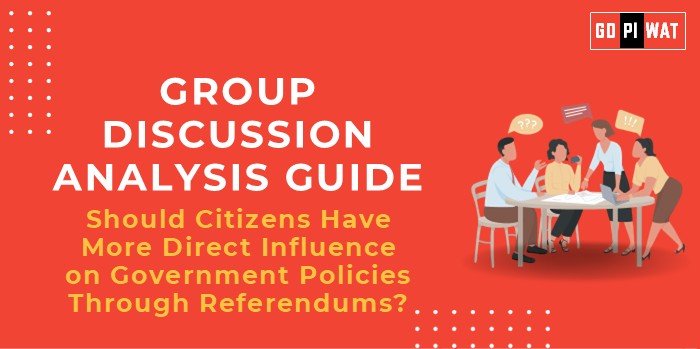📋 Group Discussion Analysis Guide: Should Citizens Have More Direct Influence on Government Policies Through Referendums?
🌟 Introduction to the Topic
Referendums allow citizens to directly participate in decision-making, bypassing traditional legislative processes. Globally, they are seen as a tool for fostering democracy but also face criticism for oversimplifying complex issues. With increasing political engagement and demand for transparency, referendums are becoming a pivotal subject in discussions about governance reforms.
📊 Quick Facts and Key Statistics
- 🌍 Global Referendum Usage: Over 500 national referendums held globally since 1990, showcasing its role in decision-making.
- 🇬🇧 Brexit (2016): 51.9% voted to leave the EU, reflecting the divisiveness of direct decision-making.
- 🇨🇭 Swiss Referendum System: Switzerland conducts 4-5 referendums yearly, illustrating a model for sustained citizen participation.
- 🇮🇳 India’s Voter Turnout (2019): 67.4% participation in general elections, indicating significant citizen engagement in democratic processes.
🏛️ Stakeholders and Their Roles
- 👥 Citizens: Express preferences directly, enhancing accountability and ownership of decisions.
- 🏢 Government: Facilitates the referendum process while maintaining balance between direct and representative democracy.
- 📰 Media: Shapes public opinion by disseminating information and framing debates.
- 🌍 International Bodies: Monitor processes to ensure fairness and adherence to democratic norms.
🏆 Achievements and Challenges
✨ Achievements:
- 📈 Increased Political Participation: Referendums empower citizens to voice their opinions on critical matters directly.
- 📊 Policy Legitimacy: Decisions reflect the majority’s choice, boosting trust in governance.
- 🇨🇭 Swiss Success Story: Frequent referendums ensure continuous citizen engagement in policy-making.
⚠️ Challenges:
- ❌ Oversimplification of Issues: Complex policies reduced to binary choices, risking uninformed decision-making.
- 📣 Populism Risk: Referendums can be swayed by emotion-driven campaigns rather than rational debates.
- ⚠️ Low Participation: Risk of low voter turnout undermining the legitimacy of decisions.
🌍 Global Comparisons
- 🇬🇧 United Kingdom (Brexit): Highlights the divisiveness of referendums on contentious issues.
- 🇺🇸 California (Propositions): Demonstrates the financial burden and complexity of implementing referendum outcomes.
📖 Case Studies:
- 🇨🇭 Switzerland: Consistent voter engagement through structured referendum mechanisms.
- 🇨🇱 Chile (2020): Successful constitutional referendum with 78% support for drafting a new constitution.
💬 Structured Arguments for Discussion
- ✅ Supporting Stance: “Referendums enhance democratic participation by giving citizens a direct say in policy decisions.”
- ❌ Opposing Stance: “Complex governance issues cannot be decided through oversimplified yes/no votes, risking populism.”
- ⚖️ Balanced Perspective: “While referendums promote engagement, they must complement, not replace, representative democracy for nuanced decision-making.”
📌 Effective Discussion Approaches
- 🎯 Opening Approaches:
- 📊 Statistical Highlight: Start with global referendum trends to set context.
- 🌍 Comparative Analysis: Mention Swiss and UK examples to contrast outcomes.
- 📰 Current Context: Discuss rising citizen activism and demand for transparency.
- 🛡️ Counter-Argument Handling:
- 📚 Acknowledge risks of populism; counter with education-driven campaigns to inform voters.
- 🇨🇭 Highlight cases where structured referendums yielded productive outcomes, such as Switzerland.
📊 Strategic Analysis of Strengths and Weaknesses
- 🌟 Strengths: Promotes transparency, enhances public trust, aligns policies with majority preferences.
- ⚠️ Weaknesses: Risks of misinformation, polarization, and oversimplification.
- 🌟 Opportunities: Increased digital tools for wider participation, fostering a better-informed electorate.
- ⚠️ Threats: Populism, voter fatigue, and administrative costs.
📚 Connecting with B-School Applications
- 📖 Real-World Applications: Analyze the feasibility of referendums in corporate governance, such as shareholder voting systems.
- 🗨️ Sample Interview Questions:
- ⚖️ “How can referendums coexist with representative democracy?”
- 🌍 “What lessons can India learn from Switzerland’s referendum model?”
- 📖 Insights for B-School Students:
- 📚 Leverage case studies on participatory governance for projects.
- 🌟 Explore the impact of referendums on public policy and economic stability.


